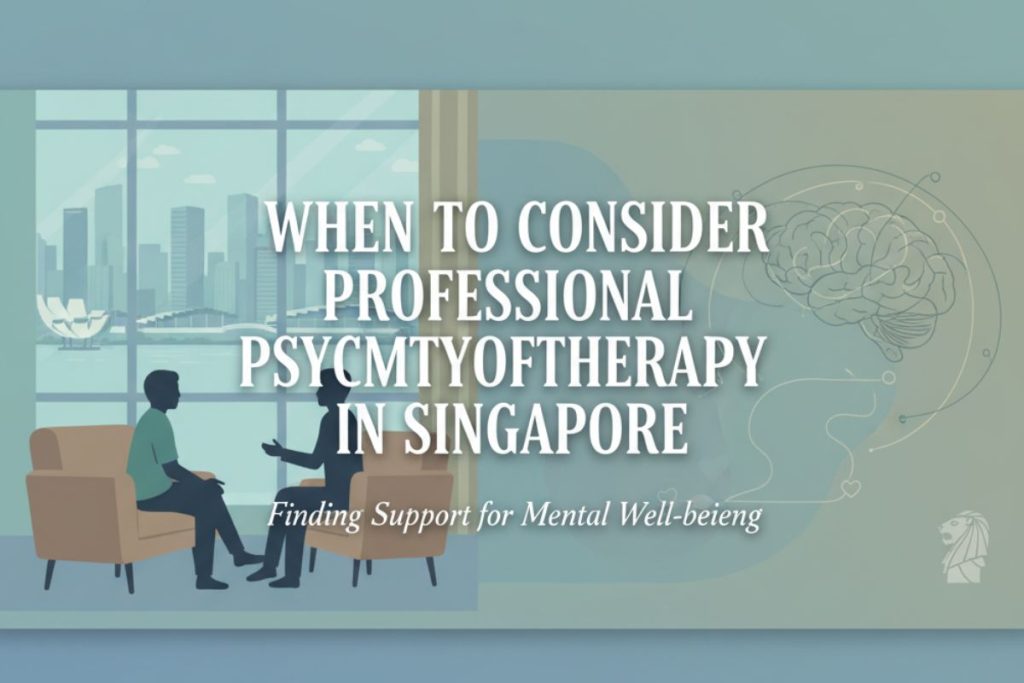Mental health concerns often develop quietly—through sleepless nights, growing irritability, or feelings of emptiness that never seem to fade. In a city like Singapore, where ambition and performance are highly valued, emotional well-being can easily take a backseat. Recognising when to seek professional psychotherapy in Singapore can make a significant difference in one’s overall quality of life.
Understanding Psychotherapy and Its Purpose
Psychotherapy, often referred to as “talk therapy,” involves working with a trained therapist to identify and manage emotional, behavioural, or psychological issues. It’s not limited to those facing severe mental illness; it’s also beneficial for individuals dealing with relationship difficulties, burnout, anxiety, or self-esteem issues.
Through guided sessions, psychotherapy helps uncover thought patterns, reshape responses to stress, and develop healthier coping mechanisms. It’s a process that promotes self-awareness and emotional resilience—core elements of long-term mental stability.
Signs That Indicate It’s Time to Seek Professional Help
1. Persistent Sadness or Emotional Numbness
Everyone experiences low moods occasionally, but when sadness lingers for weeks or months without improvement, it may signal something deeper. A professional therapist can help explore these feelings and address potential causes such as depression or unresolved grief.
2. Anxiety That Disrupts Daily Life
Feeling nervous before a big presentation or exam is normal. But when anxiety begins to interfere with work performance, relationships, or sleep, it may require professional intervention. Psychotherapy provides structured techniques to manage anxiety triggers and reframe irrational fears.
3. Struggles with Relationships
Conflicts within families, friendships, or romantic relationships can sometimes spiral beyond control. Therapy can act as a neutral space to rebuild communication, understand emotional triggers, and heal interpersonal wounds.
4. Overwhelming Stress or Burnout
Singapore’s fast-paced lifestyle often blurs the line between productivity and exhaustion. Chronic fatigue, irritability, or detachment from one’s responsibilities can be early signs of burnout. Working with a psychotherapist helps restore balance, redefine boundaries, and rediscover motivation.
5. Unresolved Trauma
Trauma—whether from childhood experiences, accidents, or loss—can quietly shape thoughts and behaviours for years. Professional psychotherapy in Singapore offers evidence-based methods like cognitive behavioural therapy (CBT) and trauma-focused interventions that guide individuals towards recovery and empowerment.
The Role of a Qualified Psychotherapist
A qualified psychotherapist in Singapore holds extensive training in psychology and counselling methodologies. They are skilled in assessing emotional patterns, applying therapeutic frameworks, and supporting clients across various stages of healing.
Sessions are confidential and tailored to suit each client’s pace and comfort level. Over time, individuals gain insights into their behaviour, learn to challenge negative thought cycles, and cultivate tools to manage emotions more effectively.
Whether it’s coping with depression, managing anger, or improving relationships, therapy is a collaborative process built on trust and empathy.
Why Seeking Help Is a Sign of Strength
Many still associate therapy with weakness or instability. In truth, taking the initiative to seek help demonstrates courage and self-awareness. It shows a willingness to grow and to take control of one’s mental and emotional well-being.
Acknowledging the need for professional support doesn’t mean something is “wrong.” Instead, it signals a healthy step towards self-understanding and balance. Mental health deserves the same attention as physical health—and seeking therapy is an act of self-care, not surrender.
Different Types of Psychotherapy in Singapore
1. Cognitive Behavioural Therapy (CBT)
CBT helps individuals identify negative thinking patterns and replace them with constructive, reality-based perspectives. It’s highly effective for anxiety disorders, depression, and phobias.
2. Psychodynamic Therapy
This approach delves into past experiences and unconscious patterns that influence present behaviour. It’s especially helpful for understanding deep-rooted emotional conflicts and long-term behavioural habits.
3. Mindfulness-Based Therapy
By focusing on present-moment awareness, mindfulness-based therapy aids in reducing stress and emotional reactivity. It helps individuals build acceptance and self-compassion.
4. Family and Couples Therapy
Therapy sessions involving families or couples aim to resolve conflicts, improve communication, and strengthen emotional bonds within relationships.
How to Choose the Right Therapist in Singapore
Finding the right therapist can feel daunting, but it’s a vital part of the process. Look for licensed professionals registered with reputable associations such as the Singapore Association for Counselling (SAC) or Singapore Psychological Society (SPS).
Consider factors such as:
- Their experience with specific issues like anxiety, trauma, or grief
- Their therapeutic approach and communication style
- Comfort and rapport during initial sessions
Most therapists offer consultation sessions, allowing clients to gauge compatibility before committing to long-term therapy.
What to Expect During Your First Session
The first session usually focuses on understanding your background, concerns, and goals for therapy. You’ll discuss what prompted you to seek help and explore the challenges affecting your daily life.
Therapists often ask open-ended questions to gain a clearer understanding of emotional triggers and patterns. Sessions remain confidential and non-judgmental, creating a safe space to express thoughts freely.
Over time, progress is measured not by the absence of pain but by increased clarity, emotional control, and the ability to handle life’s uncertainties with confidence.
Frequently Asked Questions
Q1: Is psychotherapy covered by insurance in Singapore?
Some insurance plans and employee wellness programmes do offer coverage for mental health therapy. It’s advisable to check directly with your provider or employer.
Q2: How long does therapy usually take?
The duration varies depending on individual needs. Some clients find clarity after a few sessions, while others engage in therapy for several months or more to work through deeper issues.
Q3: Can I combine psychotherapy with medication?
Yes, many people benefit from a combination of psychotherapy and medication prescribed by a psychiatrist. This integrated approach often produces stronger outcomes for conditions such as depression or anxiety disorders.
Q4: How often should I attend sessions?
Most clients begin with weekly sessions, adjusting the frequency as progress is made. Your therapist will help determine the best schedule based on your goals and emotional needs.
Conclusion
Emotional struggles are not signs of weakness but invitations to heal and grow. Recognising the need for professional psychotherapy in Singapore can be the first step toward rediscovering peace, purpose, and confidence. With the right guidance, individuals can break free from limiting patterns, rebuild their emotional resilience, and lead more fulfilling lives.
Mental well-being is not a luxury—it’s a foundation for a balanced and meaningful life. Seeking therapy is not about fixing what’s broken; it’s about building a healthier relationship with oneself.







